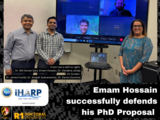Emam Hossain successfuly defends his PhD Proposal!
Congratulations to Emam!
Emam Hossain (UMBC), iHARP Research Assistant successfully defended his PhD Proposal on Thursday, June 5, 2025. Join iHARP in congratulating Emam on his successful PhD Proposal defense!
Title
Causal Representation Learning for Dynamical Systems: Uncovering Causal Mechanisms in Climate Science
Committee
- Dr. Md Osman Gani (Chair/Advisor), UMBC
- Dr. Vandana Janeja, UMBC
- Dr. James Foulds, UMBC
- Dr. Aneesh Subramanian, UC Boulder
- Dr. Devon Dunmire, KU Leuven
Abstract
Causal reasoning is fundamental to understanding dynamic processes in
complex scientific systems such as climate, glaciology, and remote
sensing. While modern deep learning models have demonstrated strong
performance on sequence modeling tasks, they often rely on purely
correlational representations, limiting their generalization and
interpretability under distribution shifts or partial observability.
This dissertation presents a principled progression of methods that
integrate causal discovery and representation learning for modeling
dynamic systems. First, we reinterpret Reconstructed Phase Space (RPS)
modeling as an unsupervised representation learning approach for
satellite-derived time series, enabling interpretable classification of
supraglacial lake evolution via Gaussian Mixture Models. We then extend
this with a causally-informed temporal modeling framework using PCMCI+
to identify stable, regionally meaningful predictors, which improve
generalization and robustness in sequence classification models.
However, both methods operate in the space of observed variables and do
not recover unobserved mechanisms. To address this limitation, we
propose a novel Causal Representation Learning (CRL) framework for
dynamic systems that employs variational autoencoders with
interventional regularization to learn low-dimensional latent variables
aligned with underlying causal factors. This framework is designed to
support do-operations and counterfactual reasoning in latent
space, and will be validated on benchmark datasets with known causal
graphs (Pendulum, Flow, CelebA), before being applied to supraglacial
lake dynamics as a real-world use case. Collectively, this work aims to
advance the boundary of causal modeling in temporal systems by bridging
the gap between statistical representation learning and structural
causal inference, offering scalable and interpretable tools for
scientific discovery in dynamic, high-dimensional environments.
Tags:
Posted: June 17, 2025, 9:50 AM
